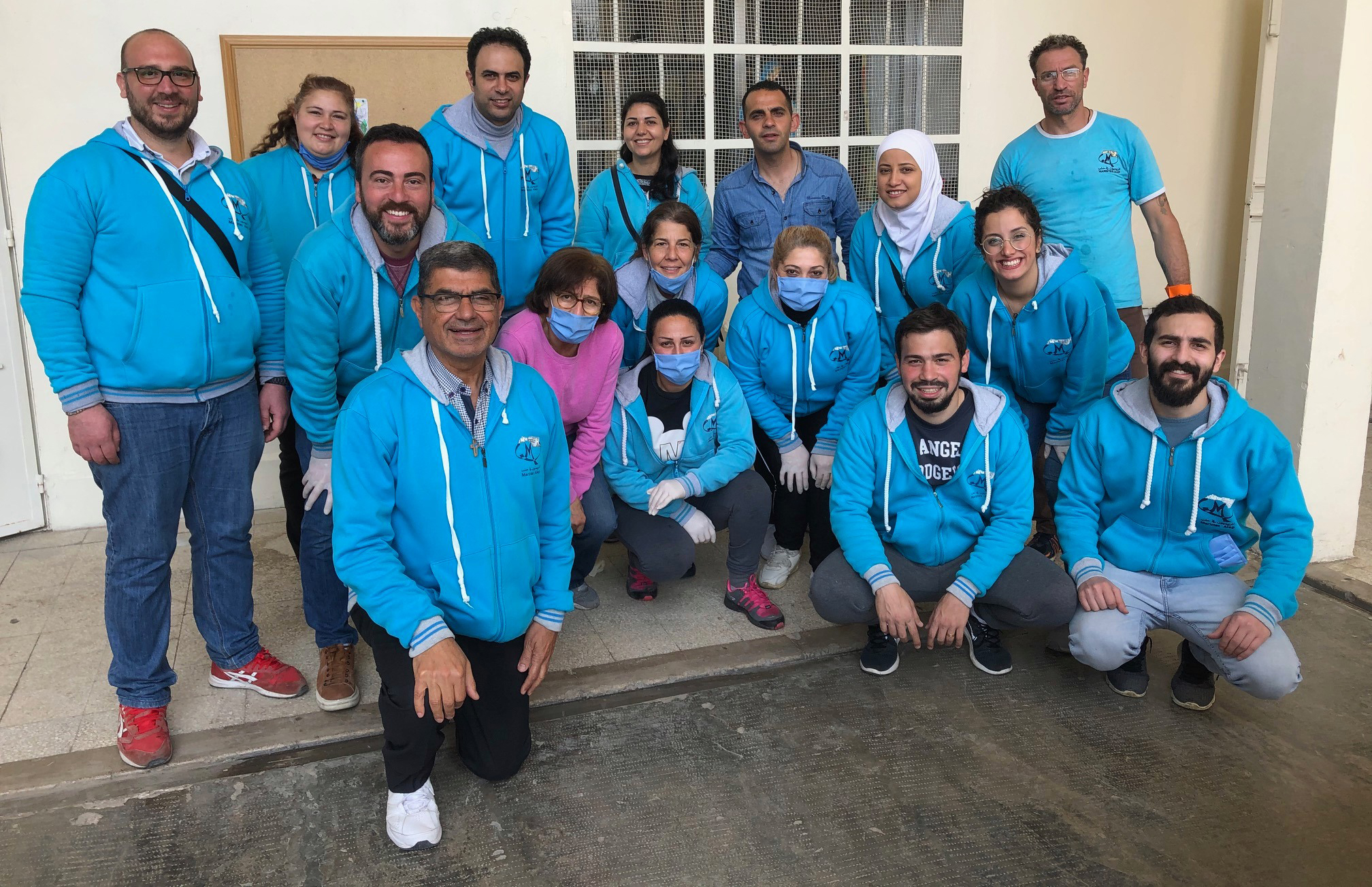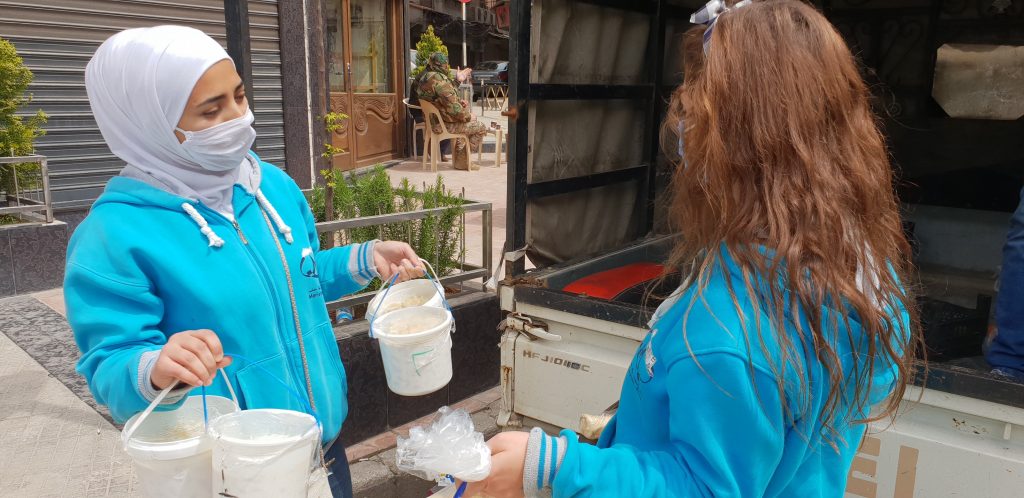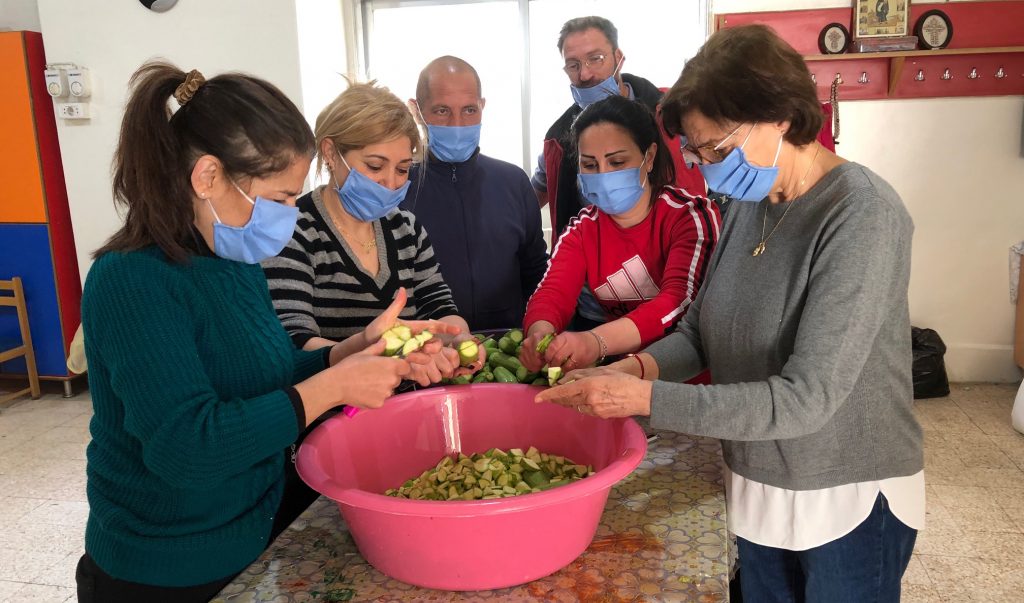
War, sanctions, corona, Caesar, economical crisis and what else?
Letter from Aleppo 39 – July 1st, 2020
The Syrian people no longer know which saint to devote themselves to. The
tragedies, one after another, are not alike but lead to the same result: that of continuing to make the Syrian people suffer, who only want to live in dignity in peace.
Let’s start with the war. It has been going on for over nine years. It has claimed hundreds of thousands of lives and ten million of internally displaced persons and refugees, forced one million people into exile, destroyed Syria’s infrastructure and ruined a country that was, once, peaceful, safe, stable and prosperous.
Fighting between Syrian army and jihadists
Last February, the Syrian army launched an offensive to liberate part of the Idlib province held by the Islamists of the Al-Nosra group. On February 16, it took control of the main highway that links Aleppo to the rest of Syria and which has been in rebel hands since 2013. It also liberated the western suburbs of Aleppo occupied by rebel armed groups since 2012. These jihadists continued to bomb Aleppo every day, even after the liberation of the eastern districts and the reunification of the city three years ago.
On February 16, the Aleppins were jubilant because, after several years of war, they could finally sleep without being afraid of the fall of a mortar, and also take this highway which links Aleppo to the other cities of Syria and Lebanon. The following day, a civilian aircraft landed at Aleppo airport for the first time in the past eight years.
Unfortunately, there has been a counteroffensive by terrorist groups supported by the Turkish air force and drones. They regained control of the highway and certain areas liberated by the Syrian army. In early March, negotiations between Russia and Turkey led to a cease-fire agreement. The rebels have withdrawn from the highway, and since then, there has been no fighting in Syria. The situation is completely frozen. And with the Covid-19 crisis, young people are no longer called upon to do military duty.
However, a frozen situation is not a settled case since Syria has not yet liberated all of its territory: part of the Northwest and part of the Northeast are illegally occupied by Turkey, another area in the Northeast is occupied by Kurdish militias that are supported and armed by the Americans and finally, the province of Idlib with its terrorists, mostly foreigners.
Coronavirus crisis
The Aleppins celebrated the military advance with joy and regained hope for a better future after nine years of suffering and misery. But, they hardly had time to rejoice and enjoy a return to a normal life, when the coronavirus crisis set in with all the preventive measures taken by the authorities to prevent the spread of the virus.
Apart from food stores, pharmacies and bakeries, everything has been closed: schools, universities, factories, workshops, shops and all public places; a curfew was introduced from 6 p.m. to 6 a.m. In addition, the lockdown included a ban on leaving one’s city, even to go to the countryside and villages in the same region. Syrians, in general, and Aleppins, in particular, followed the orders wearing masks, avoiding kissing (a widespread tradition in the middle-east) and using disinfecting gel. These preventive measures have slowed the spread of the epidemic; fortunately, there are, so far, only 293 reported cases of covid-19 and 9 deaths. Now that the situation is more or less under control, the lockdown has been lifted; universities, factories and shops have resumed their activities. The official middle and high school’s final exams began on June 21.
On the other hand, these measures paralyzed social life and froze all economic activity which was struggling to resume. The majority of Syrians, impoverished by nine years of war, can no longer make ends meet, especially day workers, artisans and owners of small businesses who rely on their daily income to live or barely survive; not to mention the retired, the unemployed and the sick who no longer have any source of income. All NGOs have, at best, slowed down their activities considerably if they have not stopped them completely.

The economy does not start
Ruined by nine years of war, strangled by unjust and illegal European and American sanctions, the economy does not start. The sanctions spare humanitarian assistance but prevent the trade and import of products, block all financial transactions by all Syrian citizens and ban all reconstruction projects.
Cynically, European officials claim that the sanctions are targeted and only target those in power and profiteers from the war and do not concern medicines, medical equipment and food.
Pure hypocrisy; If the bank accounts of all Syrians are frozen and a Syrian citizen, no matter who, cannot make financial transactions, such as wire transfers, how can you buy the exempt products? if you know of any western companies who agree to provide us with free products, we are interested. And as many products are smuggled in from Turkey or Lebanon, they are sold at exorbitant prices, impoverishing the population and enriching the profiteers of the war, which is the opposite of the claimed motives of those who have imposed sanctions.
As if that was not enough, the Americans have aggravated the situation by the new “Caesar” law which sanctions any company in the world that conducts business with Syria.
These sanctions constitute a form of collective punishment against the civilians. This is classified as a crime against humanity by the Geneva convention. They have the effect of imposing suffering on the civilians, without any effect on the end of the war or the advancement towards a political solution of the conflict.
The economic situation is catastrophic. The inflation is rampant, the price of products has increased threefold in six months. One dollar was worth 50 Syrian pounds (LS) before the war, it was 1000 LS three months ago; it has just reached 2500 LS. People, already impoverished by the war years having exhausted their meager savings, can no longer make ends meet. Those who have dared to undertake a commercial, industrial or entrepreneurial activity bite their fingers in regret, because they work at a loss, and often have to close their shops forever and declare bankruptcy. Syrians are tired, desperate and depressed.
And we, the Blue Marists, what are we doing in this misery?
We try, with the means we have, to relieve suffering and to sow hope.
Prayer, discernment and our ability to be sensitive to the distress of people and to listen to their calls, made us rediscover that there were in Aleppo old people, living alone, having no more family in Syria, some bedridden or sick and who, because of confinement, have no one left to bring them food. So, we started at the beginning of the Covid-19 crisis, a new project that we called “Solidarity Coeurona” (Coeur in French means heart). For the past 3 months, Blue Marist ladies have been cooking a hot meal every morning for 125 people. Around 1 p.m., our young volunteers distributed them to the homes of elderly beneficiaries. With the meal, they give them bread, fruit, their presence and their listening. We have found that, in addition to the meal they need, how difficult these people are to live alone and need to feel human touch, special attention and to see a smile. This is what our volunteers do not fail to do.
From the beginning, this project had to be limited in time and stop with the end of the pandemic. For weeks, we visited each of these seniors. We have seen tragedies that we never imagined; people aged 80 to 95 living alone (or with disabled children) in inhumane conditions, without families, without support, mostly sick and sometimes bedridden, who have not left their houses for years, and who only have for help a neighbor or a distant relative who passes from time to time.
I am thinking of F.A., 92 years old, who lives in a single room with his 3 psychotic boys aged 55 to 70.
I think of the Y.M family: the bedridden 90-year-old husband with Alzheimer’s and his 85 year old wife with a cardiac illness, their blind son and their daughter-in-law, the only healthy person who must take care of everyone including her autistic son.
I think of M.K., 90 years old, blind, living alone in her apartment.
This is why, we decided to continue the project by developing it and forming a special team for this 15th ongoing program of the Blue Marists.

Blue Marists’ projects
The gathering of people having been prohibited during confinement, we, the Blue Marists, had to temporarily freeze 10 of our 14 projects: our two educational projects for children from 3 to 6 years old “Learn to Grow” and “I Want to Learn” , our project “Bamboo” for the care of adolescents, “Seeds” for the psychological support of children, adolescents and adults traumatized by war, our “Woman Development” program, our “Cut and Sew” program, “Heartmade” project to recycle leftover fabrics to make unique pieces for women, MIT, our adult training center, all these projects have been temporarily frozen. However, with the lifting of confinement measures 15 days ago, all of these projects have resumed feverishly.
As for our 2 development programs, “Micro-Projects” and “Vocational Training”, we continued them despite the confinement. The micro-projects program consists of teaching during 48h sessions (20 adults per session) spread over 3 weeks the skills necessary to open a micro-project, and then finance it to allow our young people to have a livelihood, and no longer be dependent on aid provided by NGOs. The “Vocational Training” project consists of putting young people in apprenticeship with craftsmen for one year, so that they learn a profession, and we support them financially, so, that they become their own boss. This is how we currently have 30 young adults in apprenticeship to learn how to be a carpenter, electrician, plumber, pastry chef, cell phone repairer, car mechanic, dressmaker etc.
Despite Covid-19, we also continued: the “Drop of Milk” project, which distributes milk every month to 3000 children under the age of 11; the project “Displaced Family Housing”, and the medical program for medical care for the poor.
We put on hold, temporarily, our educational activities of our project “Colibri”, taking care of a camp for displaced Kurds 30 km from Aleppo, during the Covid-19 crisis. We, nevertheless, went to the camp to distribute the food and hygiene parcels and diapers for the babies; and our medical team went there once a week to care for the sick people in the camp and the surrounding area. Now all activities have resumed as before.
We are tired exhausted
As all the Syrians living in Syria, we are tired, tired and exhausted. We are also revolted by Western policies which allow the situation to rot without taking any initiative of dialogue with the authorities of the country; outraged by the sanctions imposed on the 16 million Syrians living in the territories under the control of the state; revolted by the illegal occupation of 30% of the territory of a sovereign state, one of the 50 founding members of the United Nations, by the Turkish and American army (which occupies the region of the Syrian oil wells depriving the State of resources much needed); outraged by the unlimited support of Turkish and Western governments and international NGOs to Islamist terrorists who occupy the province of Idlib.
Sometimes, we think about throwing in the towel and stopping. However, when we think that others, now more than ever, need our presence, our support and our help, we take with more vigor the path of solidarity initiated 9 years ago. And we leave the rest to the grace of God.
__________________
Aleppo, July 1st, 2020
Dr Nabil Antaki – On behalf of the Blue Marists
